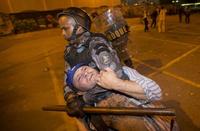-
Engineered enzymes to neutralize deadly effects of chemical weapons
Researchers are a step closer to creating a prophylactic drug that would neutralize the deadly effects of the chemical weapons used in Syria and elsewhere. The researchers are trying to engineer enzymes — called bioscavengers — so they work more efficiently against chemical weapons.
-
-
Pentagon’s excess equipment makes local police resemble military units
In the early 1990s, Congress authorized the Pentagon to transfer excess military equipment to law enforcement agencies across the country for use in counter-drug activities. Since the program’s inception, the Pentagon has transferred $4.3 billion worth of military equipment to local and state agencies. In 2013 alone, $449,309,003 worth of military property was transferred to law enforcement. Critics say that more and more police departments now resemble military units, and that military gear is used in cases where it should not – as was the case in a small Florida town in 2010, when officers in SWAT gear drew out their guns on raids on barbershops that mostly led to charges of “barbering without a license.”
-
-
Synthetic aperture sonar to help in hunting sea mines
Mines are plentiful and easy to make. Some mines explode on contact. Others are more sophisticated, exploding or deploying torpedoes when their sensors detect certain acoustic, magnetic or pressure triggers. Some can destroy a ship in 200 feet of water. Since the Second World War, sea mines have damaged or sunk four times more U.S. Navy ships than all other means of attack combined, according to a Navy report on mine warfare. New sonar research could improve the Navy’s ability to find sea mines deep under water. The underlying technology, known as synthetic aperture sonar (SAS), uses advanced computing and signal processing power to create fine-resolution images of the seafloor based on reflected sound waves.
-
-
Technology allows human to climb like geckos
Historically, gaining the high ground has always been an operational advantage for soldiers, but the climbing instruments on which they are frequently forced to rely — tools such as ropes and ladders — have not advanced significantly for millennia. DARPA’s Z-Man program has demonstrated the first known human climbing of a glass wall using climbing devices inspired by geckos. The historic ascent involved a 218-pound climber ascending and descending twenty-five feet of glass, while also carrying an additional 50-pound load in one trial, with no climbing equipment other than a pair of hand-held, gecko-inspired paddles.
-
-
Badly engineered missile defense systems deployed “because there was a rush”
In 1983 President Ronald Reagan launched the Strategic Defense Initiative (SDI) to build space- and ground-based missile defense systems. The space-based component was abandoned as impractical, and the focus shifted to Ground-based Midcourse Defense systems (GMD). Despite disappointing results and program test failures, Congress and the George W. Bush administration pressed forward with spending billions on acquiring systems of questionable reliability. “We recognize the problems we have had with all the currently fielded interceptors,” Undersecretary of Defense Frank Kendall old an industry gathering in February 2014. “The root cause was a desire to field these things very quickly and very cheaply; we are seeing a lot of bad engineering, frankly, and it was because there was a rush.”
-
-
Inexpensive seismic alert device may help Mexico City residents

Mexico City has been experiencing an unusually large number of tremors within the past few months, and though the country has one of the most advanced seismic alert systems in the world, many residents are unable to receive notifications before tremors occur. Mexican regulations limit the sale of government-issued earthquake alert receivers to one private company, but since the receivers cost an average of $310, most families are unable to afford them. Andres Meira, a 39-year-old architect, has designed an earthquake alert receiver, which costs only $54 at retail, which taps into the government’s earthquake alert frequency to notify its users of a pending earthquake.
-
-
The real reason for a decline in violent crime

A scientific analysis of twenty million words recorded during 150 years of criminal trials at London’s Old Bailey reveals how changes in culture rather than law helped to reduce violent crime, according to a new study. “What we have been able demonstrate through analyzing the language used in court is that the decline in less serious forms of violence, such as assault, was not led by legislation or moments of dramatic change in the law, but by social attitudes,” says one of the authors.
-
-
Number of world’s nuclear weapons reduced, but modernization continues
The overall number of nuclear weapons in the world continues to decline, but none of the nuclear weapon-possessing states are prepared to give up their nuclear arsenals for the foreseeable future. At the start of 2014 nine states — the United States, Russia, the United Kingdom, France, China, India, Pakistan, Israel, and North Korea — possessed approximately 4000 operational nuclear weapons. If all nuclear warheads are counted, these states together possessed a total of approximately 16,300 nuclear weapons compared to 17,270 in early 2013.
-
-
How has Iraq lost a third of its territory to ISIS in three days?

The Islamic State of Iraq and the Levant (ISIL), also known as ISIS, has about 12,000 fighters in its ranks. About 8,000 needed only forty-eight hours to take Mosul, Iraq’s second largest city, although it was defended by more than 27,000 government troops. It took ISIL another twenty-four hours to gain control of about one-third of Iraq – facing little, if any, resistance from Iraq’s one-million-strong security apparatus. The reasons: After the U.S. occupation force, in 2003, dismantled Iraq’s professional military, a new Iraqi army was re-established from militia members and low-ranking members of the Ba’ath army. Senior officers in Saddam Hussein’s forces were dismissed, which gave rise to at least two security issues. Firstly, military officers of the previous army were steered toward terrorist groups. Secondly, Iraq’s new military suffered from the loss of expertise and military discipline instilled by their former officers. In addition, poor governance has led to widespread corruption in both political and military spheres. Military personnel are routinely reported to be soliciting bribes, especially in Sunni areas of Iraq.
-
-
Close air support technology helps in fire suppression
In the heat of battle, lives can depend on being able to coordinate troop positions safely while directing aircraft to provide close air support for ground forces. DARPA’s Persistent Close Air Support (PCAS) program aims to help overcome those challenges by providing soldiers with advanced digital tools for situational awareness and targeting in place of legacy communications systems and traditional paper maps. Firefighters battling wildfires face challenges very similar to those that troops face in battle — the need for situational awareness, precise coordination of airborne water drops and ensuring fellow firefighters are kept safe from rapidly moving and shifting flames. Technology developed for air-to-ground warfare has been adapted to help firefighters combat deadly forest blazes.
-
-
Free app alerts CPR-trained individuals to a heart attack case in their immediate vicinity
Speed and timeliness is instrumental to saving the life of a victim of cardiac arrest, so Santa Clara Countyagencies have adopted PulsePoint, a free mobile application (app) which uses location-based technology to alert CPR-trained residents and bystanders if someone in their immediate area is experiencing sudden cardiac arrest. Once alerted, residents can decide whether they are available to reach the victim and begin resuscitation until official emergency responders arrive.
-
-
World Cup security teams focus more on crime, protests – less on terrorism

During the 2014 FIFA World Cup, currently being held across twelve different venues across Brazil, security teams have extensively prepared for measures to be taken against crime and protest related to heated political unrest. American bomb-busting robots, Israeli surveillance drones, and German anti-aircraft tanks — an international assortment of security officials and measures – are just some of the pieces of the greater security apparatus protecting both players and fans.
-
-
New generation of aerial robots for high-risk missions
The need for robots able to carry out high-risk service tasks, such as the inspection of power plants and the cleaning of skyscrapers, is growing. Robots which actively interact with the environment without being constrained on the ground are well suited to such tasks.
-
-
Defense in terror case challenges exclusion from court session on surveillance records
The defense for Adel Daoud, a young Muslim man who was arrested outside a Chicago bar in an undercover FBI operation and charged with attempting to blow up the bar, has submitted a motion objecting to a private court session held to discuss the defense’s access to classified records. “Not only do I not get to be there, but I didn’t even get to object,” defense attorney Thomas Durkin said. “I had to object over the fact that I couldn’t even make an objection.”
-
-
Laser weapon developed for Marine vehicles

As the U.S. Navy prepares to deploy its first laser weapon on a ship later this summer, Office of Naval Research (ONR) officials announced that they have finished awarding contracts to develop a similar weapon to be used on ground vehicles. The Ground-Based Air Defense Directed Energy On-the-Move program, commonly referred to as GBAD, aims to provide an affordable alternative to traditional firepower to keep enemy unmanned aerial vehicles (UAVs) from tracking and targeting Marines on the ground.
-
More headlines
The long view
Factories First: Winning the Drone War Before It Starts
Wars are won by factories before they are won on the battlefield,Martin C. Feldmann writes, noting that the United States lacks the manufacturing depth for the coming drone age. Rectifying this situation “will take far more than procurement tweaks,” Feldmann writes. “It demands a national-level, wartime-scale industrial mobilization.”
How Male Grievance Fuels Radicalization and Extremist Violence
By Haily Tran
Social extremism is evolving in reach and form. While traditional racial supremacy ideologies remain, contemporary movements are now often fueled by something more personal and emotionally resonant: male grievance.
The Surprising Reasons Floods and Other Disasters Are Deadlier at Night
By Kate Yoder
It’s not just that it’s dark and people are asleep. Urban sprawl, confirmation bias, and other factors can play a role.
Why Flash Flood Warnings Will Continue to Go Unheeded
By Rebecca Egan McCarthy
Experts say local education and community support are key to conveying risk.
